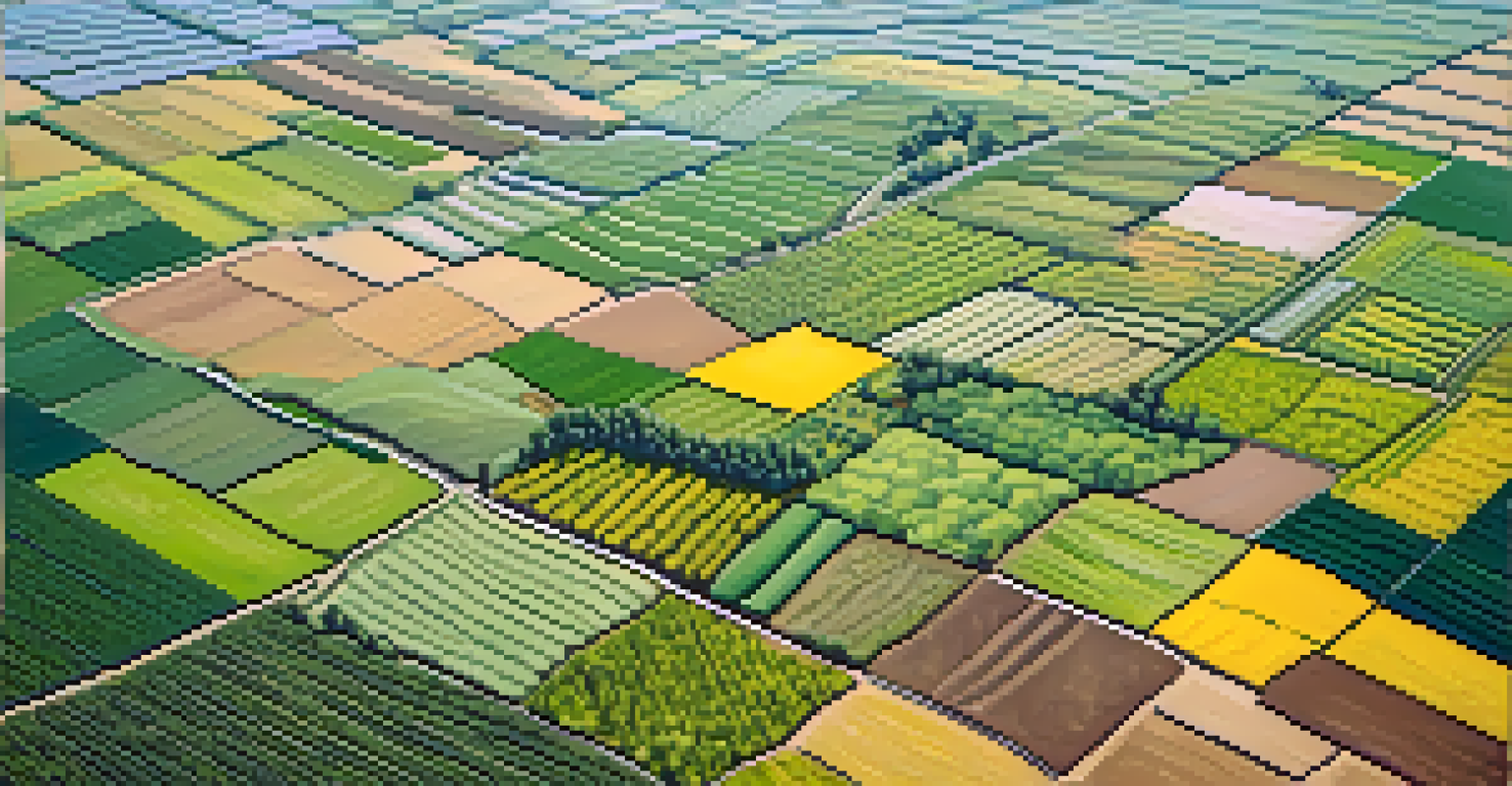The Future of Plant Breeding: Resilience in a Changing World

Understanding the Need for Resilient Plant Breeding
As climate change and global challenges mount, the importance of resilient plant breeding becomes increasingly clear. With unpredictable weather patterns and shifting growing conditions, farmers need crops that can withstand these stresses. Resilient plants can not only survive but thrive in these changing environments, ensuring food security for future generations.
The greatest threat to our planet is the belief that someone else will save it.
The traditional methods of plant breeding, while effective, often take years to yield results. In contrast, modern techniques like genetic engineering and CRISPR technology are speeding up this process. These innovations allow scientists to quickly introduce desirable traits such as drought resistance or pest resilience into existing crops, making them more adaptable to new challenges.
Ultimately, the goal of resilient plant breeding is to ensure that our food systems remain robust. By developing crops that can handle extreme conditions, we can protect the livelihoods of farmers and the nutrition of communities worldwide. This approach is not just about survival; it’s about thriving in a world that's constantly evolving.
Innovative Techniques Transforming Plant Breeding
Recent advancements in plant breeding techniques have opened up new possibilities for crop enhancement. Genetic modification, for instance, allows scientists to pinpoint specific genes that confer desirable traits. This precision means that crops can be tailored to meet specific environmental challenges without altering their overall makeup.

In addition to genetic modification, techniques like marker-assisted selection help breeders identify and select plants with favorable traits more efficiently. This method combines traditional breeding practices with modern technology, making the process faster and more effective. By leveraging these innovative techniques, we can create crops that are not only resilient but also high-yielding.
Resilient Breeding Ensures Food Security
By developing crops that can withstand climate challenges, resilient plant breeding is essential for maintaining global food security.
Moreover, the integration of data science and artificial intelligence into plant breeding is revolutionizing the field. These technologies enable researchers to analyze vast amounts of data, predicting how plants will perform under various conditions. As a result, the future of plant breeding looks promising, with the potential for breakthroughs that were once unimaginable.
The Role of Biodiversity in Plant Breeding
Biodiversity plays a crucial role in the resilience of plant breeding efforts. A diverse gene pool allows for greater adaptability, meaning that crops can better withstand diseases, pests, and climate variations. By incorporating wild relatives of crops into breeding programs, scientists can tap into a treasure trove of genetic diversity that may hold the key to future resilience.
In the end, we will conserve only what we love; we will love only what we understand; and we will understand only what we are taught.
However, as urbanization and monoculture farming practices expand, biodiversity is at risk. This loss can lead to vulnerabilities in our food systems, making it essential to prioritize the preservation of diverse plant species. Conservation efforts, such as seed banks and genetic reserves, are vital in safeguarding this diversity for future breeding initiatives.
Incorporating biodiversity into plant breeding not only enhances resilience but also promotes sustainable agricultural practices. By fostering a variety of crops, farmers can reduce dependence on chemical inputs and improve soil health. This holistic approach ensures that both the environment and food systems can thrive together in harmony.
Sustainable Practices in Modern Plant Breeding
Sustainability is at the heart of modern plant breeding, driving researchers to develop crops that require fewer resources. By focusing on traits that enhance efficiency—such as drought tolerance or nutrient-use efficiency—breeders can help reduce the environmental footprint of agriculture. This shift towards sustainability is crucial in addressing the pressing challenges of food production.
Practices like organic farming and agroecology are gaining traction, and plant breeding must align with these principles. Breeders are increasingly looking at how to create plants that can thrive in organic systems, which often rely on natural pest control and soil health. This synergy between breeding and sustainable practices can lead to healthier ecosystems and more resilient food systems.
Tech Innovations Enhance Crop Breeding
Advancements in genetic engineering and data analysis are transforming plant breeding, allowing for faster development of high-yield, resilient crops.
Moreover, sustainable plant breeding can contribute to climate change mitigation. By developing crops that sequester more carbon or require less irrigation, breeders can play a significant role in reducing agriculture's impact on the planet. This commitment to sustainability not only benefits farmers but also ensures a healthier planet for future generations.
The Intersection of Technology and Plant Breeding
The rapid evolution of technology is reshaping plant breeding in exciting ways. Techniques such as genomics and bioinformatics are providing breeders with tools to analyze genetic information at an unprecedented scale. This technological integration allows for more precise breeding decisions, ultimately leading to more resilient crops.
Additionally, remote sensing and drone technology are being used to monitor crop health and performance in real-time. By gathering data on plant growth and environmental conditions, breeders can make informed decisions about which traits to prioritize. This data-driven approach enhances the efficiency of breeding programs and supports the development of crops that are better suited to their environments.
As technology continues to advance, the potential for innovation in plant breeding is limitless. From automated breeding systems to machine learning algorithms, these tools are making the process faster and more effective than ever before. The future of plant breeding lies at the intersection of technology and agriculture, paving the way for more resilient and sustainable food systems.
Global Collaboration in Plant Breeding Efforts
Addressing the challenges of climate change and food security requires a collaborative approach to plant breeding. Researchers, farmers, and policymakers must work together to share knowledge and resources. Global partnerships can facilitate the exchange of ideas and innovations, ensuring that the best practices in plant breeding are accessible to all.
Organizations like the International Rice Research Institute and the CGIAR system are leading the way in fostering such collaborations. By pooling their expertise, these institutions can accelerate the development of resilient crops that can adapt to diverse environments. This collective effort is essential in tackling global food challenges effectively.
Biodiversity Supports Plant Resilience
Incorporating diverse genetic resources into breeding programs is vital for creating crops that can adapt to environmental stresses.
Moreover, engaging local communities in the breeding process is vital for success. Farmers often possess invaluable traditional knowledge about local crops and conditions. By incorporating this knowledge into modern breeding practices, we can create solutions that are not only effective but also culturally relevant and widely accepted.
Ethical Considerations in Plant Breeding Innovations
As we venture further into the realm of advanced plant breeding techniques, ethical considerations come to the forefront. Questions about the safety and long-term implications of genetically modified organisms (GMOs) are prevalent among consumers and advocacy groups. It's essential for breeders to communicate transparently about their methods and the benefits they bring to food security and environmental sustainability.
Moreover, issues of equity and access must also be addressed. As new breeding technologies emerge, there is a risk that they may only be accessible to wealthier nations or large agribusinesses. Ensuring that smallholder farmers and developing countries benefit from these innovations is crucial for global food security.

Finally, ongoing dialogue between scientists, policymakers, and the public is necessary to navigate the ethical landscape of plant breeding. By fostering a culture of transparency and collaboration, we can build trust and support for the advancements that will shape the future of agriculture.